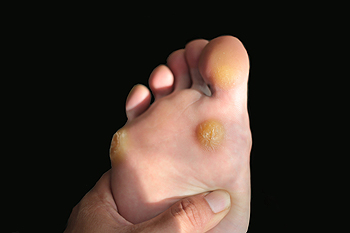6650 Frankford Ave
Philadelphia, PA 19135
 While similar to a callus, corns are harder, smaller, and generally more painful thickened layers of the skin that appear as small lumps on the feet and toes. Typically caused by irritation and friction, corns can be incredibly uncomfortable to deal with if left untreated. To avoid getting a corn, it’s recommended that you wear footwear that gives your toes room to move freely in, you keep your feet clean and moisturized, and you keep your toenails properly trimmed. To help treat corns, it’s often advised that you soak your feet in warm water before filing at it with a pumice stone. Moisturizing after filing and using corn pads may also help to reduce your corn. If your corn is extremely painful, causing swelling, redness, or drainage of pus, we recommend that you consult with a podiatrist as soon as possible for professional care and treatment.
While similar to a callus, corns are harder, smaller, and generally more painful thickened layers of the skin that appear as small lumps on the feet and toes. Typically caused by irritation and friction, corns can be incredibly uncomfortable to deal with if left untreated. To avoid getting a corn, it’s recommended that you wear footwear that gives your toes room to move freely in, you keep your feet clean and moisturized, and you keep your toenails properly trimmed. To help treat corns, it’s often advised that you soak your feet in warm water before filing at it with a pumice stone. Moisturizing after filing and using corn pads may also help to reduce your corn. If your corn is extremely painful, causing swelling, redness, or drainage of pus, we recommend that you consult with a podiatrist as soon as possible for professional care and treatment.
If you have any concerns regarding your feet and ankles, contact John M. Fanelly, DPM of Northeast Philadelphia. Our doctor will treat your foot and ankle needs.
Corns: What Are They? and How Do You Get Rid of Them?
Corns can be described as areas of the skin that have thickened to the point of becoming painful or irritating. They are often layers and layers of the skin that have become dry and rough, and are normally smaller than calluses.
Ways to Prevent Corns
There are many ways to get rid of painful corns such as wearing:
Treating Corns
Treatment of corns involves removing the dead skin that has built up in the specific area of the foot. Consult with Our doctor to determine the best treatment option for your case of corns.
If you have any questions please feel free to contact our office located in Philadelphia, PA . We offer the newest diagnostic and treatment technologies for all your foot and ankle needs.